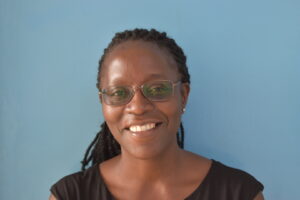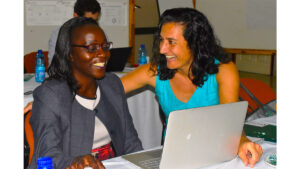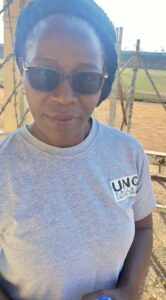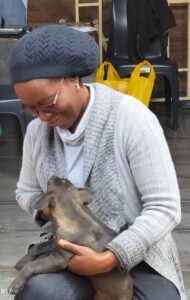Cecilia Kanyama, MB, BS, is a physician-scientist with UNC-Project Malawi who teaches at the University of Malawi College of Medicine, and her work is changing world health guidelines and policy. She completed her first years of medical school in Australia and her postgraduate training with the University of Cape Town in South Africa, supported by UNC-Project. It was these experiences that helped develop her understanding of diversity, culture and practice of medicine in different settings. When she’s not working, she enjoys animals and nature on a farm in her district. She says if she hadn’t become a physician-scientist, she might be a veterinarian.

How did you choose infectious diseases?
The choice was based on need of infectious diseases specialists within the hospitals in Malawi. The time I was graduating from medical school, anti-retroviral treatment (ART) access was very limited, and our hospitals were full of people with HIV (PWH), suffering and dying from opportunistic infections and other infectious diseases. Despite robust ART programmes this trend remains in that about 32% of medical admissions are in PWH (against a national prevalence of 8.9%), and 50% presenting with advanced HIV disease. In addition, the main cause of medical admission for PWH remains opportunistic infections. And the main diagnosis in the medical ward, regardless of HIV status, remains infectious causes. Now, with increasing non-communicable diseases (NCDs), such as diabetes, hypertension, cardiovascular disease, cancers, etc., we will be integrating NCDs management within the systems for infectious diseases management, such as ART clinics, community outreach for ART delivery, home-based care, etc.

What was your pathway to becoming a physician?
We had no medical school in Malawi, and for my first years of medical school, I travelled to Australia through a Malawi and Australia government scholarship. When the medical school started, I returned home to Malawi to complete the last three years. From 2008 to 2012, UNC Project-Malawi supported my postgraduate training in internal medicine at the University of Cape Town in South Africa. Again, at that time, there was no postgraduate training in Malawi in the medical field, and my journeys were not easy because I had to leave home and family for long periods of time. But this was also the most rewarding experience, in building my understanding of diversity, culture and practice of medicine in different settings. I have worked with UNC Project-Malawi since 2003.
 What do you find most rewarding about your work?
What do you find most rewarding about your work?
The opportunity to combine clinical work, clinical research and lecture students fulfills all aspects of the ideal career for me. It is also satisfying to see our clinical research work changing the management of different conditions, and being adopted into policy by many countries.
What are some of the new developments in your speciality that you’re excited about?
The response to COVID–how a pandemic so devastating has, to a good extent, been controlled through innovative research and how we as leaders in infectious disease were key players in helping our respective areas of work manage and contain the disease. I am also very excited with how we have developed a care package for managing advanced HIV disease. I’ve led cryptococcal meningitis trials at our site in Lilongwe since 2013, and I’m happy to see how the clinical trials have changed the management of this devastating disease to reduce mortality. And we continue to lobby for equitable access to medications and better formulation of key medications such as flucytosine.
 Is there a particular achievement that has been most gratifying to you?
Is there a particular achievement that has been most gratifying to you?
There is such fulfillment to see a clinical trial that you have led at the site being completed, published and recognized in policies. This is the ultimate satisfaction. And being a physician, every success in saving a life or alleviating suffering is rewarding.
What is the best advice you’ve ever received?
Hold on. Keep trying and you will get it.
If you weren’t an infectious disease physician, what would you like to be doing?
Perhaps, I would be doing veterinary medicine. I love animals and because my daughter has a passion for animals, we tend to adopt a few from the neighbors. Currently, we have adopted a kitten named Richie into the family. I also enjoy the freshness and quiet nature of a farm in my home district, away from town. It is a good place for reflection and renewal when I’m off duty.
What hobbies do you enjoy?
Game viewing, reading, travel and volunteering at church.
Do you have a favorite quote or life motto?
Be yourself. Everyone is already taken.
What was the last book you read?
I Have Life: Alison’s Journey. This is the triumphant story of a woman who refused to become a victim after a violent attack and nightmare journey in Cape Town. The story describes how courage allowed her to turn a devastating experience into something life-affirming and strong, which has become an inspiration to people everywhere.
The Institute for Global Health & Infectious Diseases (IGHID) attracts people who are driven to make big change. From principal investigators and grant managers to regulatory specialists and study coordinators, everyone has an important role to play in what we do around the world. We are pleased to highlight colleagues who proudly serve IGHID.
